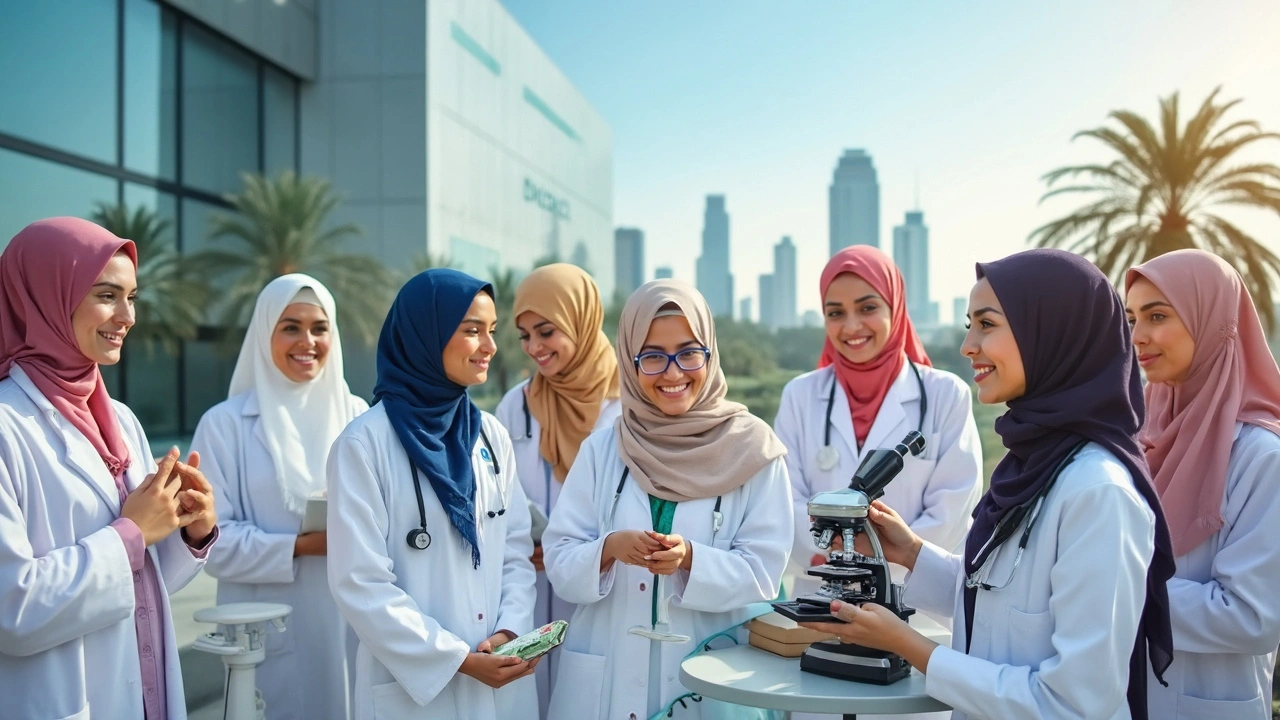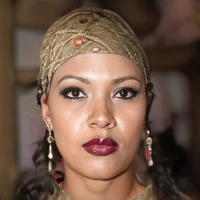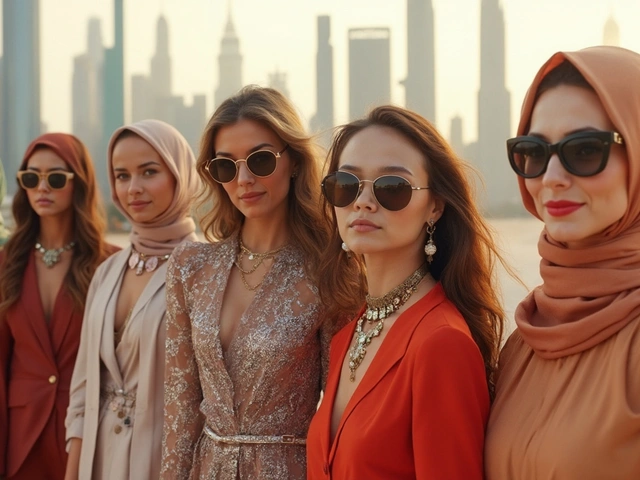If you think you know where the future of healthcare is growing fastest, you might not guess this glimmering spot in the desert. Dubai Medical College for Girls stands out, not just in the UAE but in the entire Middle East. It’s one of those places that flips expectations on their head—mixing tradition with the latest science labs and turning out female doctors who lead the charge in hospitals all over the world. This isn’t just a school; it’s a movement.
The Story Behind Dubai Medical College for Girls
Back when most people thought medical school was a man’s world, Dubai Medical College for Girls (DMCG) took a different path. Founded in 1985, it was the first private medical college in the UAE dedicated to the education and training of women in medicine. That was a bold move in a region where female doctors were rare, to say the least. The idea started with Haj Saeed Bin Ahmed Al Lootah, a well-known philanthropist, who wanted to give women a real shot at becoming leaders in healthcare. Since then, DMCG has grown into a powerhouse with a reputation that stretches well beyond Dubai’s borders.
What’s truly unique is how the college blends cultural values with world-class education. While you’ll find all the latest medical equipment and digital learning platforms here, there’s also a strong respect for the individual backgrounds and traditions of every student. The college welcomes students from across the globe, but still holds tightly to its mission: creating doctors who excel not just in science, but in compassion and ethics. In fact, the curriculum is recognized by the UAE Ministry of Education and bears international accreditations which makes it a solid choice for students wanting options abroad.
There’s a restless energy about the place—every year, almost 700 students flock here, hungry for a seat in those lecture halls. Alumni go on to specialties from pediatrics at Rashid Hospital to research at Cleveland Clinic Abu Dhabi. And the college is constantly updating its facilities; only last year, it rolled out an advanced simulation center for real-life practice—a rarity even among more expensive global institutions.
Here’s a number to keep in mind: about 80% of their MBBS graduates land residency programs either in the UAE or overseas within two years. Now, that’s no fluke; DMCG pushes for clinical exposure early and partners closely with healthcare networks like the DHA (Dubai Health Authority). If you want proof that it’s more than hype, just check graduation statistics—almost 97% of their students are licensed to practice after the first attempt at the UAE licensing exam, according to a 2023 graduate follow-up report.
“Empowering women to become compassionate competent physicians has always been at the heart of our mission.” – Dr. Raja Easa Al Gurg, Chairperson, Dubai Healthcare City Authority
Admissions and Entry Requirements
So, what does it actually take to get into the Dubai Medical College for Girls? First off, it’s competitive. The admissions team screens hundreds of applications every year from ambitious women across the Middle East, Asia, Europe, and even Africa. Here’s what’s on their checklist: a strong academic background in the sciences, a passion for medicine (and being able to show it helps), and a clear commitment to serve. You’ll need to ace subjects like Biology, Chemistry, and Physics — think an average of 85% or higher on your final school marks or the equivalent for international qualifications (like A-Levels or IB).
Beyond grades, DMCG looks for well-rounded applicants. There’s the required English proficiency, usually IELTS (minimum 6.0) or TOEFL scores, just to make sure students can handle the tough terminology. But what really sets candidates apart? Evidence of extracurriculars, volunteering, internships at clinics, or even shadowing a physician for a few weeks. The personal interview is the clincher. Here, you’ll have to show you’re ready for the pressure and have the heart for tough days in medicine. According to recent admission statistics, only about 18% of applicants are formally admitted each year.
If you’re an international student, Dubai Medical College for Girls makes things smoother than many schools. They offer visa support, orientation programs, and even an academic bridging course for those who might need extra grounding in science or English before the program kicks off. Tuition fees hover around AED 140,000 per year (about USD 38,000 as of 2025), but the college awards scholarships to top candidates—both merit-based (for academic excellence) and need-based, especially for students from low-income backgrounds. Financial support is more generous now after a boost in the college’s endowment last year.
Let’s not forget prerequisites specific to this region: female applicants only (obviously), and a willingness to follow the campus’s dress code. Modesty and professionalism go hand in hand here, with tailored white coats replacing traditional uniforms. The admissions process opens each January, rolling all the way to June with final offers out by mid-July. If you nail everything, be ready for orientation in September—complete with an intro to their famous anatomy labs (which have 3D hologram simulations now, by the way).
A lot of students stress about housing and living in Dubai. The campus provides on-site dorms, with tight security and flexible visiting hours for families. You’ll never find yourself stranded, as the college even arranges pick-up from Dubai International Airport for international newcomers. It’s these small touches that help new students settle in quickly and focus straight away on their studies.
| Requirement | Details |
|---|---|
| Academic Marks (Science Stream) | 85% average or higher (or equivalent international grades) |
| English Proficiency | IELTS 6.0 / TOEFL equivalent |
| Application Window | January to June |
| Annual Tuition (2025) | AED 140,000 (approx. USD 38,000) |
| Acceptance Rate | 18% |
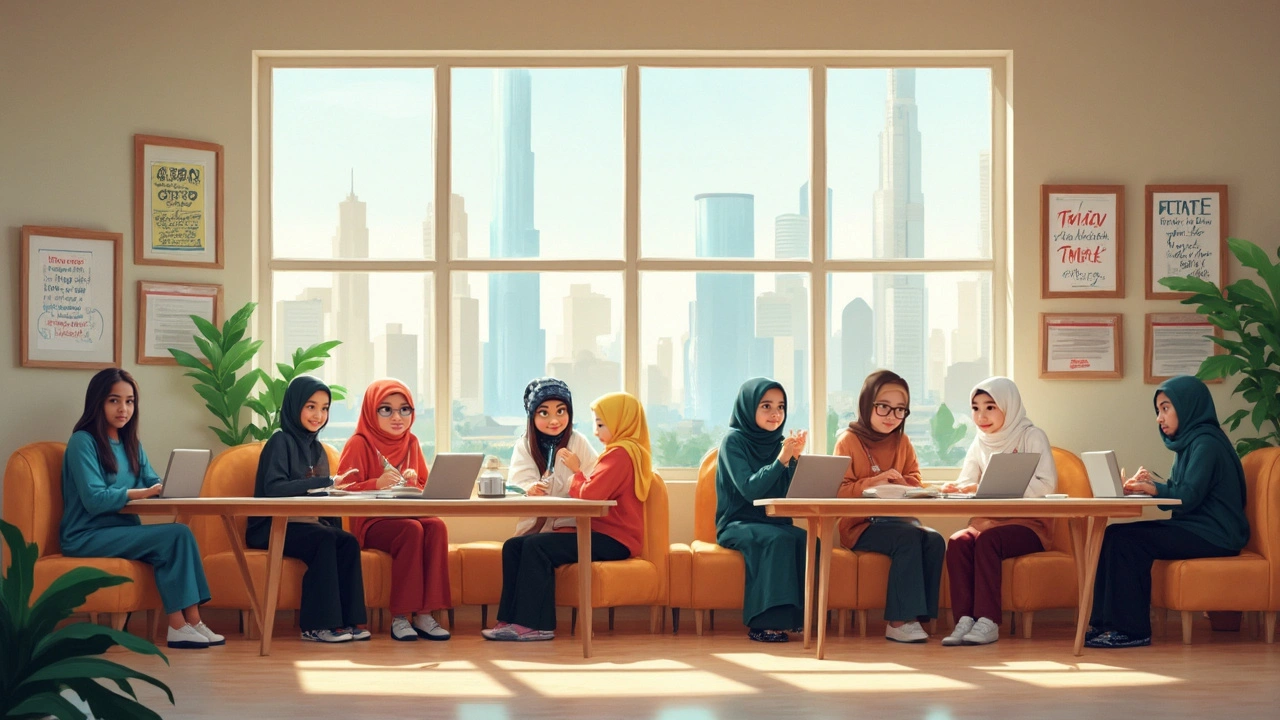
Academic Programs and How They Work
The star attraction at Dubai Medical College for Girls is its flagship MBBS program. It’s a six-year journey—five years packed with courses and labs, and a final clinical year getting hands-on in hospitals. DMCG follows a hybrid curriculum blending international best practices with UAE healthcare needs. First, there’s the basic science stage—think Anatomy (with those magical 3D models), Biochemistry, Physiology. But don’t expect to stay stuck in a lecture hall all day. The college is a firm believer in early clinical exposure, so students start shadowing doctors and interacting with patients from their second year itself.
One cool fact: DMCG has partnerships with over 10 major hospitals across Dubai and Sharjah. That means you might find yourself learning bedside skills at Dubai Hospital one week, and then rotating through the pediatric center at Latifa Hospital the next. This diversity helps graduates fit into different specialties later on. Clinical rotations include Internal Medicine, Surgery, Pediatrics, Obstetrics/Gynecology, Psychiatry, and Emergency Medicine. Many students love these placements—as one 2024 graduate put it, “You have to think on your feet, adapt in real time, and that’s when you realize, you’re really going to be a doctor.”
Assessments at DMCG are tough but fair. Exams come in many flavors: MCQs, practical exams in the labs (using both manikins and real patients), and OSCEs (Objective Structured Clinical Examinations). Regular feedback from professors makes sure you know exactly where you stand. And guess what? No massive final exam surprise—grading is continuous, which helps everyone keep pace and avoid burnout. For those keen on research, there’s a dedicated Medical Research Center. Every year, students get chances to participate in projects—from genetics to public health challenges specific to the Emirates. This exposure often leads to presentations at international conferences or even publications in peer-reviewed journals.
Don’t forget extracurriculars. Medical school is tough, but DMCG knows happy students are stronger students. The college runs clubs for medical innovation, mental health advocacy, charity healthcare, and even art therapy for future doctors. They also host the DMCG Science Festival each April, which brings together students and mentors for hackathons, debates, and clinical case competitions. These activities boost your leadership skills and confidence, so you’re not just memorizing textbooks but learning to work in dynamic, often intense, teams.
For students with an eye on international careers, DMCG supports licensing exam prep for the USMLE (United States), PLAB (UK), and AMC (Australia). There are workshops for interviews, CV writing, and peer mentoring sessions with alumni who already cracked global exams. That’s why so many DMCG grads now work in the NHS, Canadian hospitals, and big names in the US and Australia.
Campus Life, Community, and Support Systems
This campus isn’t just labs and lecture halls. What surprises most newcomers is how much effort goes into building a close-knit, supportive community. Dorm life is organized more like a family than a boarding house. New students are paired with “big sisters”—upperclassmen who show the ropes, answer late-night questions, and help with everything from grocery shopping to prepping for practicals. For international students, these friendships cut through any culture shock. If you’re worried about fitting in, DMCG has you covered with cultural orientation sessions and diverse student societies.
Security and comfort are top priorities. Dorms come with 24/7 staff, flexible curfews, and access to counseling services. The campus itself is visually stunning, full of gardens and shaded courtyards—places to take a breather between hustle-bustle classes. The cafeteria serves everything from Emirati classics to international dishes. You’ll quickly find your favorite “study fuel,” whether it’s karak tea or pasta. There’s a fully equipped gym, and yoga classes take place twice a week (seriously, stress is no stranger in med school!).
DMCG stands out for its wellness programs. The Student Affairs office runs mental health workshops and stress support circles throughout the year. The on-campus medical clinic is available for everyday needs, with discreet counseling if you’re ever overwhelmed. It’s not just lip service—research from the college’s own psychology department shows that students who use these services report 50% lower rates of burnout during exam season.
If you’re thinking Dubai is all study and no play, think again. Students organize regular outings: trips to the desert, old souks, or even movie nights at Dubai Mall. The college is minutes away from the Creek and not far from tourist hotspots. Student clubs for drama, debate, and even chess host competitions and bring a break from the grind. Study groups form naturally; many students say their closest friends are the ones who crammed for anatomy finals together at 2 am.
Community involvement is big here. Each semester, students take part in free health camps, local clinics, and humanitarian projects. The idea is to train doctors who understand real communities, not just diseases. It makes for some unforgettable stories—one batch did eye screenings for construction workers, while another raised funds for refugee women’s health. DMCG wants its doctors street-smart and heart-strong, not just book-smart.
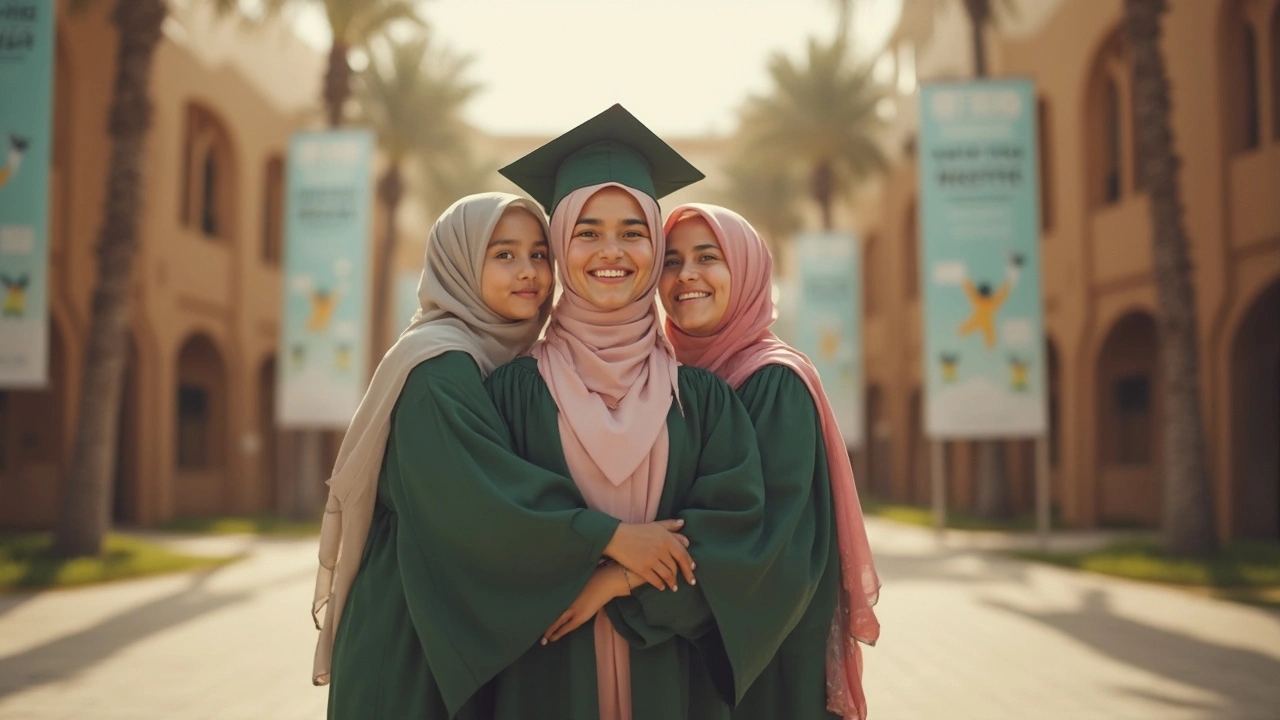
Career Prospects and the Road Ahead
Graduating from Dubai Medical College for Girls is just step one, but it’s a big step. The degree is recognized by the Ministry of Education, and the college’s standing means it opens doors everywhere from Abu Dhabi to London. If you’re keen to stay local, Dubai Medical College for Girls arranges direct placements for internships and residencies in partner hospitals. About 60% of their most recent class got spots at top UAE sites—think Dubai Hospital, Rashid Hospital, and Zulekha Hospital.
For those chasing an international dream, the college plays a hands-on role, too. They guide students through applying for USMLE, PLAB, or AMC, including recommendation letters and mock interviews. Alumni success stories are impressive—names you’ll see in prestigious cancer centers, research labs, and even as medical faculty in the US and UK. The alumni network is powerful and active, regularly offering webinars, Q&As, and mentorship to students prepping for exams as far as Canada and Australia.
Let’s talk specialties. While a lot of graduates choose Internal Medicine, Pediatrics, or Surgery, there’s a growing pull towards Family Medicine, Public Health, and even Medical Ethics. The college encourages exploration, giving summer electives in places as diverse as rural hospitals in Africa and advanced research centers in Germany. In a 2024 survey, 90% of DMCG alums reported finding a job or residency slot within one year of graduation. Employers regularly mention how ready the doctors are—not just with skills, but with compassion and bedside manners.
As the UAE pushes for more locally trained doctors (to reduce reliance on expats), DMCG grads are increasingly valued. There’s also a national initiative encouraging female leadership in medicine, with many of the college’s own professors acting as advisers for government health councils. Pay attention here: starting salaries for new doctors in Dubai hospitals average around AED 28,000–32,000 per month (USD 7,500–8,700), much higher than many countries for entry-level doctors.
If entrepreneurship is your thing, several DMCG alumni have opened clinics, started health startups, or lead non-profits focusing on women’s and children’s health. Some have even returned to DMCG as lecturers, keen to inspire the next generation. You’re not just earning a degree—you’re joining a movement of women shaping the future of healthcare in the Gulf and beyond.
Table showing recent graduate destinations:
| Year | UAE Residency | International Residency | Further Study (PhD/MSc) | Private Practice or NGOs |
|---|---|---|---|---|
| 2023 | 60% | 22% | 10% | 8% |
| 2024 | 62% | 18% | 12% | 8% |
If you’re serious about a career in medicine and want to break new ground as a woman in healthcare, Dubai Medical College for Girls has the track record, community, and vision to back you up. The road isn’t easy, but the rewards—personally, professionally, and even financially—are real. Maybe you’ll be part of the next wave making history here.
